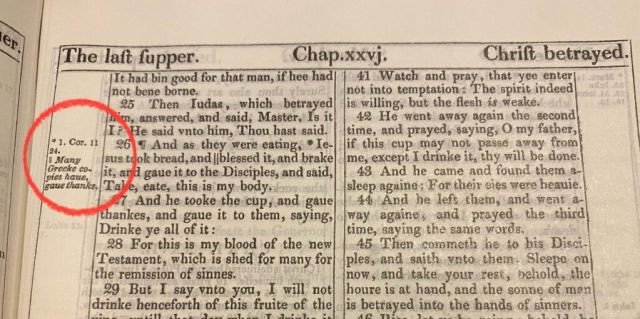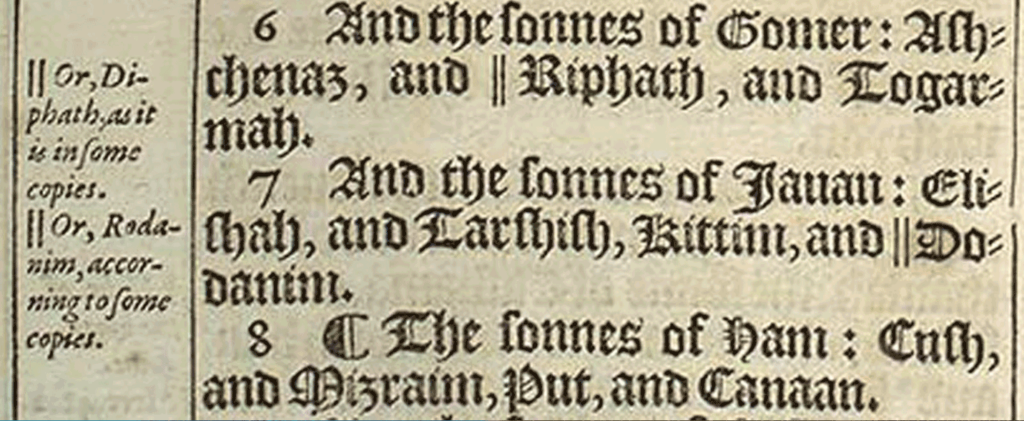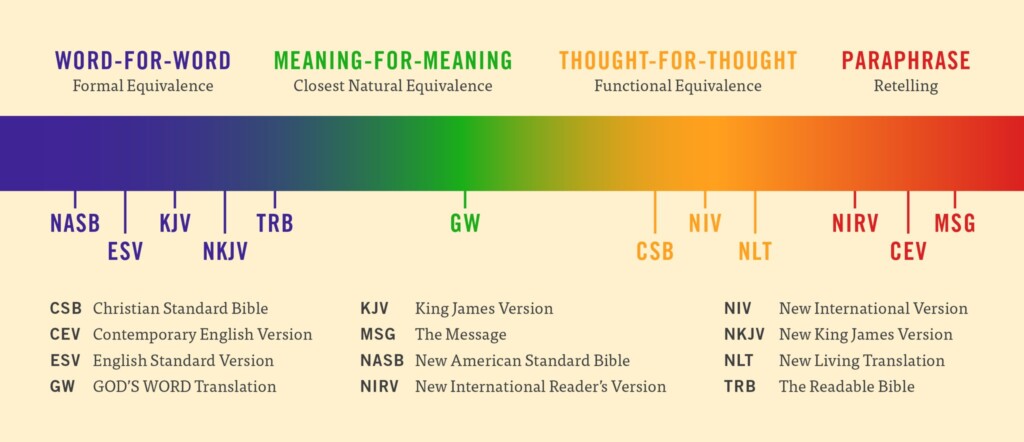This article is a Twitter thread by Josh Barzon, author of The Forgotten Preface, and is reprinted in full with permission.
The KJV stands as one of the most influential English Bible translations in history—but there’s a hidden document in its legacy that few talk about: “The Forgotten Preface.”
This nearly ancient document holds incredible insights into the translation philosophy, purpose, and process behind the KJV. Let’s uncover some of these “forgotten facts” together.

In the summer of 1611, the King James Bible was unleashed upon the world, crafted by over 50 scholars across six committees. But here’s the twist: there’s a preface, a letter from the translators, that has disappeared from most printings. This preface is crucial to grasp the translators true intentions.

Forgotten Fact #1:
The KJV translators anticipated backlash. They knew their work would be “welcomed with suspicion instead of love, and with envy instead of thanks,” as stated in “from the translators to the reader.” They understood that introducing a new translation could be seen as an attack on established Bibles like the Bishops and Geneva Bible.
“Was there ever any project that involved something new, or a renewal, that did not endure many a storm of protest and opposition?” they asked, acknowledging the inevitable criticism.

Forgotten Fact #2:
Their aim was to bring the Bible into the common man’s language. They believed “the Scripture should speak as it did in the language of Canaan,” meaning it should be understood even by “the very ordinary person,” according to “from the translators to the reader.”
They argued against the religious elite’s disdain for vulgar (common) language, echoing William Tyndale’s wish to make the Bible accessible to plowboys.
Forgotten Fact #3:
The translators acknowledged the imperfection in translations. They cited the Septuagint, with its “clumsy translation choices,” yet still considered it “the Word of God.”
“Yet did any of the apostles condemn it? Condemn it? No, they used it,” they noted in “from the translators to the reader,” revealing their belief that God blesses even flawed translations for His purpose.

Forgotten Fact #4:
They went further, asserting that even the “poorest” (or meanest) translation still contains God’s Word. They stated in “from the translators to the reader,” “the very poorest translation of the Bible into English… contains the word of God, no, is the word of God.”
This highlights their view that the essence of divine truth transcends human limitations in translation.
Forgotten Fact #5:
Contrary to popular belief, they didn’t claim perfection for the KJV. They admitted, “There is no reason why the Word, when translated, should be denied to be the Word… even though some imperfections and blemishes may be found in the expression of it,” from “from the translators to the reader.”
They encouraged the use of marginal notes and multiple translations for a fuller understanding, rejecting dogmatism on any single translation. (For example, this one reads *1 Cor. 11:24- Many Greek copies have ‘gave thanks.’)

Forgotten Fact #6:
The KJV was built on the shoulders of previous translations, not created in a vacuum. They humbly acknowledged in “from the translators to the reader,” “If we, building upon the foundation of those who went before us… endeavor to improve that which they left so good, no man… has any reason to dislike us.”
Forgotten Fact #7:
The translators believed that the age of a translation doesn’t make it superior. The KJV translators knew their work would one day be as outdated as the Latin Vulgate. They faced criticism like, “Was their translation good before? Why do they mend it now?”
This reflects their understanding that translations must evolve with language to stay relevant.

Forgotten Fact #8:
The character of translators wasn’t their measure of a translation’s worth. They pointed out historical figures like Origen and Jerome, who despite their theological errors, contributed to biblical scholarship.
“Do we try men’s faith by their persons? We should try their persons by their faith,” they argued in “from the translators to the reader,” focusing on the message rather than the messenger.

Forgotten Fact #9:
They believed in textual criticism, understanding the need for comparing and choosing between variant readings. Their footnotes acknowledge manuscript differences, showing a commitment to scholarly integrity by providing readers with alternative interpretations where texts differed.

“Or, Diphath, as it is in some copies.
Or, Rodnim, according to some copies.“

“Or, Harid, as it is in some copies”

“This 36 verse is wanting in most of the Greek copies.”
Forgotten Fact #10:
They didn’t adhere strictly to word-for-word translation. They occasionally used dynamic equivalence, as seen in Romans 6:1-2 with “God forbid” for the Greek “let it not be.”
They questioned the need for rigid translation in “from the translators to the reader,” asking, “For is the kingdom of God a matter of words or syllables?” advocating for clarity over literalism.

Forgotten Fact #11:
Despite opposition, they stood firm in faith that their work was blessed by God. They ended their preface with a prayer for divine guidance in “from the translators to the reader,” confident that “He removes the scales from our eyes, the veil from our hearts,” to help readers understand and love His Word.
This shows their ultimate trust in God’s role in their translation efforts.
Conclusion:
The King James translators were visionaries, not idolaters of their own work. In an age where KJVOism unfortunately still exists, the preface is a death blow to that fringe and unbiblical doctrine. The translators believed in a living, accessible Word of God, adaptable to the changes of language and culture. Let’s respect their legacy by embracing this view of scripture.
If you enjoyed this thread, you can read about it in Barzan’s book The Forgotten Preface: Surprising Insights on the Translation Philosophy of the King James Translators.
Furthermore, if you would like a free a copy of this e-book, reach out to him directly at @JoshuaBarzon on X, and he will give you one.
Bonus interesting fact: Not only did the original 1611 of the KJV contain the Apocrypha, where it remained for hundreds of years until was removed in the 19th century, but Hebrews 11:35 has a reference to 2 Maccabees in the footnotes.

Additional Resources: Below are links to additional resources on this topic that would be very helpful if you are interested in learning more.
“The Forgotten Preface” by @JoshuaBarzon
a.co/d/5AJ1hlj
“Authorized: The Use and Misuse of the King James Bible” by @mlward
a.co/d/il9w2Xh
“Scribes and Scripture” by @drjohnmeade and @pjgurry
a.co/d/jga6NlK
“Bible Translations for Everyone” by @timwildsmith
a.co/d/ePuDeXC
“The King James Only Controversy” by @HwsEleutheroi
a.co/d/0iYBbSm
“King James Onlyism” by Dr James Price
a.co/d/8F6NiIV























11 responses to “Op-Ed: Forgotten Facts About the 1611 King James Version (KJV) Disproves KJVO Hysterics”
What major Christian doctrine is affected by differences between the various formal and dynamic equivalence translations (barring “gender-neutral” translations like the TNIV and the so-called “paraphrases”). Do (N)KJV, NIV, ESV, or NASB readers have different views of the nature of God, the nature of man, The Gospel, the Atonement, or how to live the Christian life because of the version they read? I think not. Some of the most godly men I know use the KJV and others use (old) versions of the NIV so even if it wasn’t solely translated from the textus receptus, it’s still God’s word and it’s not returning void.
Thankfully, I don’t hang out in circles that promote KJVO-ism but the debate about the KJV is a two way street, and while I admit this is anecdotal, I have met more people returning from Christian schools and seminaries that gleefully undermine the faith of their parent’s, elder’s or anyone else they can find with a KJV Bible by telling them how unreliable and riddled with mistakes it is.
IMHO, both the KJVO and the anti-KJV people need to read 2 Timothy 2:14 and stop “wrangling about words, which is useless, and leads to the ruin of the hearers” because no one outside of their clique cares and besides everyone knows the only correct answer is to be “NASB 1977 Only” (that’s a joke, please don’t flame me).
Even if words remove are God, Jesus, Christ, Jesus Christ etc.?
Which gospel is your book referring to, theosophist?
Romas 1:16 For I am not ashamed of the gospel of Christ: for it is the power of God unto salvation to every one that believeth; to the Jew first, and also to the Greek
The Holy Bible: King James Version. (electronic ed. of the 1769 edition of the 1611 Authorized Version., Ro 1:16). (1995). Logos Research Systems, Inc.
Earn extra cash every week from the comfort of your home! This flexible part-time opportunity is perfect for anyone looking to make 300-1300 Dollars weekly. Start now and receive your first payment in just a few days. Don’t miss out—join today. Tap on Finance Economy OR Investing…
Here’s what I do……………….. https://midly.in/5v1n8c
I’m an advocate of the KJV, but not KJVO. So I no bone to pick with the conclusion here. But there’s this. This guy is posting images from a 1500’s bible, when my bible, (printed in 2005) has this exact same “hidden preface” etc. So the author’s conclusions are good, but this device is really not only unnecessary, but deceptive. Also worth noting is the fact that just because these conclusions are valid, is far from validating any particular translation. I juts have to laugh at the Reformed world going ape over the ESV when by it’s own admission in the preface, is a rehash of what all concede to be a translation produced by liberals, and infected with their bent. Why do that? I get the NKJV thing… modernizing an already good translation, but why start with something like the RSV? Plainly more is needed in this area, than just pointing out that a newer translation is OK.
RSV is decent in the OLD Testament. Their mistake is thinking they had to base the New on the same base translation. NKJV realized this isn’t true and based the New Testament on the KJV and modernized the wording, while really their Old Testament is based more on the ASV.
The older I get the more I realize that in the OLD Testament in particular, in the prophets especially, we need more modern translations. Old people have like ZERO accurate knowledge of the prophets because they only ever read the King James and had no clue what the prohets were saying. The archaism is much worse in the OLD Testament.
I initially misread the old English script replacing the “c” with an “r”. Forgive me, Lord.
Very well said Kieth S.
Sorry, I’m not persuaded. I still believe the King James Bible is the inspired English text.
Yea, hath God said,
This article written by “staff writer” is written of “their” father and it’s not Jesus.
It is not a coincidence people are leaving the church (faith) at a time when anyone can write a book and call it Bible. It seems there is no reliable word of God, and this should convince anyone deception has claimed many souls.
When over 250 books styled as Bible cannot agree with each other much less the King James Bible, (except to condemn it) why would I (or anyone) believe what is being preached in the pulpit?
Finally, before someone puts too much trust in the word of another, the author should be considered. Who wrote the translations of these other books and what is their source document?
Make money online from home extra cash more than 18000 to 21000 Dollars. Start getting paid every month Thousands Dollars online.
I have received 26000 Dollars in this month by just working online from home in my part time. every person easily do this job by. https://short-link.me/OAuS